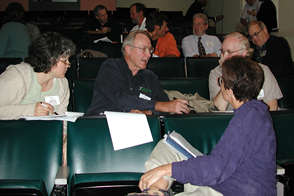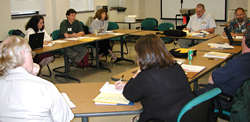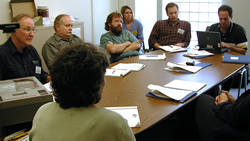NCTE
Session Summaries
Saturday, October 7
 Each
of the five working groups that met Friday
presented a summary of their discussions and a list of suggested action
plans. A general discussion followed these presentations. Some of the
points of discussion included:
Each
of the five working groups that met Friday
presented a summary of their discussions and a list of suggested action
plans. A general discussion followed these presentations. Some of the
points of discussion included:
- there is a need to identify a few immediate action items that can be implemented.
- there is a need for a representative "coalition" to work with/under/as part of NCSE to act as a clearing house for evolution efforts.
- societies should make "evolution education" a high priority issue for their long term efforts.
- organizations should iterate that basic principles of evolution are a highly fundamental aspect of peoples' lives.
- there is a need to develop websites for teaching resources and for NCTE participants to share their resources.
"Teaching Primates: Evolution in High School," Mark Terry
Mark Terry opened his presentation by elaborating upon the concept of the central importance of evolution to the understanding and teaching of biology. Although the "heart of the school" in which he teaches is the humanities program, evolution is seen as complementary to that curriculum and is so essential to teaching good science that it is threaded throughout their high school science curriculum at all levels. Terry went on to describe a high focus, three week unit on evolutionary processes required of all students at the tenth grade level and a senior level primate biology course. He concluded by stating "there is no substitute for teacher background—it really matters what you have to bring to the table" which identifies the importance of subject expertise in the effective presentation of science curriculum even at K-12 levels.
• K–12 Teachers
Facilitators: Wayne Carly and Scott
Linneman
The backdrop for the discussions of teachers was set by the existence of state standards around the country. This does not mean, of course, that standards are rigidly followed or even known by classroom teachers. However, in states where high-stakes testing is becoming the norm, standards will clearly influence what teachers can and must do in the classroom. How evolution is taught is key, and it's not clear that it's being taught well. Several needs of teachers were identified: (1) increased up-to-date, authentic, stimulating content for their courses and classes, (2) a greater confidence level in teaching evolution, (3) access to information and people to talk to when challenged on the validity of evolution, (4) the desire to be part of an overall community that would help to support and encourage their teaching on this subject. It was agreed that there is very poor pre-service training in evolution. There were also discussions on evolution as part of interdisciplinary studies and the need to increase teacher and student experience with the natural world.
• Scientists as Individual Teachers
and Communicators
Facilitators: Ellen Paul and David
Mindell
 Enhanced
public understanding of science is a vital concern, and the connections
between critical thinking skills, the scientific method and evolution
should be emphasized. There is a compelling need for scientists to play
a more active role in supporting the teaching of evolution. In their academic
and public roles, scientists should make clear that evolution is a fact
strongly supported by scientific research. All scientists need to learn
to communicate more effectively with the media and the public by speaking
plainly, without jargon, and by summarizing their research and its implications
clearly. Scientists as individuals need to develop greater sensitivity
to the perspective of religious and other cultural groups. They should
take care to show respect to those with opposing views, whether they are
encountered in class or in public forums. Scientists have a valuable opportunity
to disseminate the fact that evolution and religious faith are not mutually
exclusive.
Enhanced
public understanding of science is a vital concern, and the connections
between critical thinking skills, the scientific method and evolution
should be emphasized. There is a compelling need for scientists to play
a more active role in supporting the teaching of evolution. In their academic
and public roles, scientists should make clear that evolution is a fact
strongly supported by scientific research. All scientists need to learn
to communicate more effectively with the media and the public by speaking
plainly, without jargon, and by summarizing their research and its implications
clearly. Scientists as individuals need to develop greater sensitivity
to the perspective of religious and other cultural groups. They should
take care to show respect to those with opposing views, whether they are
encountered in class or in public forums. Scientists have a valuable opportunity
to disseminate the fact that evolution and religious faith are not mutually
exclusive.
• Professional Organizations
Facilitators: Martin Feder and Jay Labov
Each society should consider a resolution to be proactive on behalf of the teaching of evolution issue. Five general principles were identified:
- Societies should cooperate with one another to support the teaching of evolution.
- Even though they may focus on diverse areas, societies should make the teaching of evolution one of their priorities for programming, outreach, and public relations.
- Societies should inform one another [if, for no other reason, to avoid "re-inventing the wheel"].
- Societies should reach out to educational, political, governmental, religious, philanthropic, and "private sector" partners.
- Societies should exploit the Internet to further the above principles.
• Museums and Informal Science Centers
Facilitators: Jama Kolosick and Ian
MacGregor
 It
was recognized that for a variety of reasons, museums and informal science
centers in general do not do a good job of increasing the public understanding
of evolution. An overall objective should be to encourage museums to cultivate
outside relationships with the professional community, the media, and
their local communities to make the teaching of evolution a more central,
more effective, more visible, part of their portfolios. Museums need help
in developing under-represented evolution tenets. They can begin by exploiting
opportunities to coordinate their exhibits and activities with other media
events, such as the upcoming WGBH Evolution series. They should also encourage
local relationships, exploit local resources, and work with teachers to
develop activities that link the classroom as an extension of the museum.
It
was recognized that for a variety of reasons, museums and informal science
centers in general do not do a good job of increasing the public understanding
of evolution. An overall objective should be to encourage museums to cultivate
outside relationships with the professional community, the media, and
their local communities to make the teaching of evolution a more central,
more effective, more visible, part of their portfolios. Museums need help
in developing under-represented evolution tenets. They can begin by exploiting
opportunities to coordinate their exhibits and activities with other media
events, such as the upcoming WGBH Evolution series. They should also encourage
local relationships, exploit local resources, and work with teachers to
develop activities that link the classroom as an extension of the museum.
• The Media
Facilitators: Carl Zimmer and Joe Levine
Discussions revolved around what people learn from the media, what people want, and what the media provides them. Generally it was felt that (1) there is a widespread ignorance of the concept of evolution, (2) science is popular with the public, so even if they don't "get it", they are interested and the market is there, and (3) there is often a communication disconnect between scientists and journalists. Focusing on the latter point, there should be two primary goals: (1) make scientists better able to communicate with reporters, especially about evolution, and (2) help reporters to better understand evolution. Various models to accomplish these goals were examined. It is important for the scientific community to remember the diversity of the media's audience. It is not homogenous and represents different religious and ethnic views. At the same time, it is also important for journalists to recognize that in general, the public cannot evaluate science. They cannot distinguish it from pseudoscience or bad science. Thus the media should not publish non-science as science.
 "Where
Do We Go From Here?," Eugenie Scott
"Where
Do We Go From Here?," Eugenie Scott
Eugenie Scott opened her presentation by defining evolution as "cumulative change over time." She went on to discuss common misconceptions about the nature of science and the processes of evolution. As science specialists, she acknowledged that this audience recognized that "evolution is good science" and has great individual relevance, but pointed out that this understanding is often absent in the general public. She stated that the public often has the misperception that "believing in evolution means you can't believe in god" and went on to explain how spiritual beliefs and science are reconcilable. She described several situations illustrating the widespread and active resistance to teaching evolution in the public schools and called for active and proactive responses from the scientific community to ensure that K-12 science curricula are based on sound scientific principles. She described her role in providing teachers and communities with correct, concise science content information, and supporting legal advice when they do encounter resistance from other individuals about the nature of what should be taught in science class.